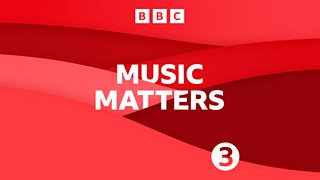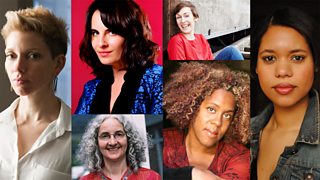Ten inspirational women using music to change lives
To mark International Women's Day 2023, Radio 3's Music Matters profiles ten women who are using music to help others in their communities and around the UK.
Here are the women changing the world with music - from grassroots community projects to equality campaigners, pioneering performers and trailblazing influencers.
Listen now on ±«Óãtv Sounds
-
![]()
International Women's Day 2023
Kate Molleson is joined by Kadiatu Kanneh-Mason, Leah Broad, Anna Clyne and Hilary Hahn for a special live IWD edition of Music Matters.
Ellie Consta, Her Ensemble
Violinist and arranger Ellie Consta is the founder-director of , a string group created to perform music written by women that also works to challenge gender stereotypes in the music industry.

Ellie started the ensemble during the first year of the pandemic, when, like many musicians, she found her career put on hold. Given time and space to reconsider things she had taken for granted about the classical music industry, and reeling from the discovery that, at the time, just 3.6% of all classical music performed worldwide was written by women, she decided to change things. “I was shocked that I’d been through music school, music college and the profession and I could only name a handful of these women,” she says. "That’s how Her Ensemble was born. It was my way of wanting to put my own spin on things… wanting to create space for musicians who didn’t feel like they had a space yet. Somewhere for people to be able to express themselves."
The ensemble have carved out a space for themselves online. In 2021, Ellie and fellow Her Ensemble musicians . "I know quite a few organisations were really thinking about dress codes and how to make positive changes to make the scene a more inclusive place for people," says Ellie. "It was a really fun way of working together with the industry to make positive progression."
Charisse Beaumont, Black Lives in Music
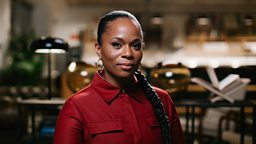
Charisse is the Chief Executive of , an organisation created to address the inequality of opportunity for black, Asian and ethnically diverse people in the jazz and classical music industries. Set up in response to the murder of George Floyd and the resurgence of the civil rights movement, the organisation provides anti-racism training and recently published a report, Being Black in the UK Music Industry, which sheds light on the lived experience of black musicians and music professionals.
"The report showed that black women were at the most disadvantage in the music industry," Charisse says. The report also revealed many systemic barriers to progression for black, Asian and ethnically diverse people in music professions, as well as in educational settings. "We are capable, we study the same, we get the same results – we just don’t get the access," says Charisse. "We want to create a music industry where everyone belongs." Black Lives in Music is now working on an industry-wide anti-racism code of conduct.
Teya-Jean Bawden, The Lullaby Project
Teya-Jean is a singer-songwriter and the Community Classes Coordinator of , where she manages – a scheme that pairs musicians with new parents to help them write lullabies for their little ones. Becoming a parent brings a host of new experiences and emotions, but it’s not unusual for some new parents to feel isolated. The Lullaby Project offers free sessions that enable local parents to meet and explore the power of music to communicate with their babies and each other. Parents are also offered free childcare during the sessions and assistance with travel costs.
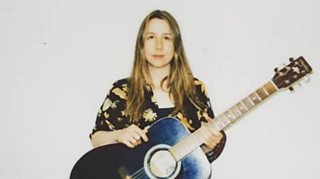
Participants have said how supported they feel by the group, and how the activity gives them a sense of achievement. “The Lullaby Project does build a sense of sisterhood and community,” says Teya-Jean. “It’s a safe space. If you’re struggling, there’s people in the room who are completely going to understand and get it… There’s a really rich exchange of wisdom between folks in the room.”
Hear more from Teya-Jean on Music Matters on ±«Óãtv Sounds.
Beverley McGeown, Open Arts
Beverley runs the , an award-winning inclusive choir in Belfast that works to improve the artistic and creative lives of disabled people. Its members include wheelchair users, blind and visually impaired people and those with non-visible disabilities like epilepsy, mental ill health and autism. However, as Beverley says: "Once the choir starts singing… disability becomes irrelevant, because the music just takes over."
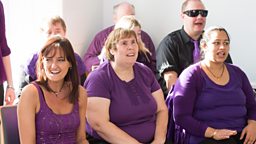
The choir has won awards at choral festivals around the UK and recorded three albums. They learn all their music aurally, so singers don’t need to be able to read music and blind or visually impaired singers aren’t at a disadvantage. “I really enjoy seeing the transformative power of music,” says Beverley. “For example, kids with autism starting to communicate with their peers for the first time, and older people with dementia singing all five verses of a church hymn after being silent for months. Just seeing people standing a bit taller after a standing ovation from an audience is therapeutic for me!”
Hear more from Beverley on Music Matters on ±«Óãtv Sounds.
Sara Lee, Music in Prisons
Sara Lee is the artistic director of the . The scheme supports groups of prisoners in UK institutions to form bands and come up with original music, which is recorded and shared with the participants and their families. "Quite often people say it’s the best thing they’ve done in prison," Sara says. "Emotionally, it’s a really big thing. Music is about communicating emotions and in the prison system, that’s something that sometimes gets squashed right down, for very understandable reasons."
The aim of Music in Prisons is to help create positive experiences that improve the confidence of offenders and open doors to other forms of education and learning, contributing to a reduction in re-offending rates. "I have an amazing and inspiring job, combining the two things I love most in life: music and people," says Sara. "On a regular basis I witness how writing and performing music can change individuals, offer them new choices and help them think differently about their future."
Hear more from Sara on Music Matters on ±«Óãtv Sounds.
Sonia Allori, musician and inclusivity champion
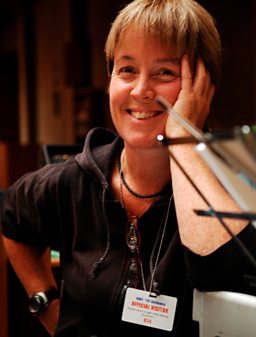
Sonia Allori was part way through a PhD in composition and training as a music therapist when she became disabled. She is now deaf and a wheelchair user, and although these factors changed the parameters of how she imagined her career in music, she decided to carry on regardless.
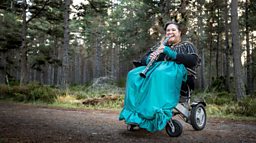
Now a composer, performer, researcher and community music therapist, Sonia often works with . “I wonder where I could have ended up if I hadn’t become disabled,” she says. “Collaborating is amazing, and I love the opportunity to make music harnessing the ideas and voices of everyone in the room.
“Inclusion is a key component in everything I do,” she continues. “It’s not an easy path, and as I battle with my own increasing disability, there is a small voice which asks: ‘Wouldn’t it be easier to give in and give up?’ But that’s not really in my vocabulary, and instead encourages me to find creative solutions, to speak up more and to ask for help.”
Shiva, guitar teacher
Iranian guitarist Shiva fled her home country two years ago and came to the UK as a refugee. In Iran, she had been a professional musician who taught guitar and gave regular performances. Since making Belfast her home over a year ago, she has started to work with the charity and is teaching guitar to asylum seekers at the Oh Yeah Music Centre in Belfast.
"I didn’t want to come here, but I had to leave my country because my life was in danger," she says. "When I arrived here, I thought that everything was finished and I can’t continue anything related to music." That all changed when Shiva was introduced to the manager of Beyond Skin, a charity that supports asylum seekers with access to music and the arts. With their help, she started a guitar club for asylum seekers. Over 150 people donated guitars, which Shiva distributed to asylum seekers from all over the world.
"It’s a good way for all of us to get rid of these bad feelings we have," she says. "Music is just like magic. It was a disaster when I came here, but with this guitar club, I could forget everything. I’m really passionate about it and really happy I could help people, the way I needed help myself."
Hear more from Shiva on Music Matters on ±«Óãtv Sounds.
Ruthie, artist and music facilitator
Ruthie is a music facilitator for a women’s songwriting group and a longstanding member of The Choir With No Name, which has branches around the UK. A survivor of domestic violence, she has also experienced homelessness and mental health issues. She joined the Birmingham branch of The Choir With No Name – which supports people affected by homelessness and other marginalised people – three years ago. “Music has always been a big part of my life. It’s a way for me to express myself, tell stories and bring my ideas to life,” Ruthie says. “Choir (With No Name) was a place that accepted me as part of their family.”
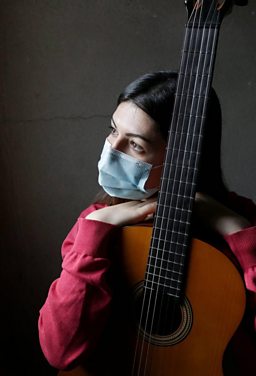
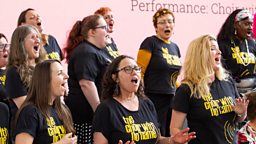
After joining the choir, Ruthie took the opportunity to join a women’s songwriting group called In Her Shoes. She now works with them as a music facilitator. "I’ve gone from being a participant to helping other women write songs," she says. "I wouldn’t have imagined I’d be here now on the other side. I’m also involved as a chorus member in Birmingham Opera Company. So basically I’m an artist now, making my own way, with choir supporting me every step of the way."
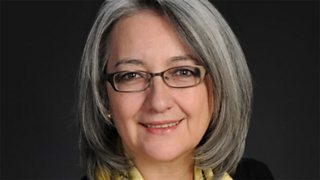
Hear more from Ruthie on Music Matters on ±«Óãtv Sounds.
Martha de Francisco, sound engineer
Martha is a legendary sound engineer who is inspiring the next generation of recording professionals. Originally from Colombia, Martha was a sound designer for the Munich Opera before joining Philips Classics in 1986 as an engineer and producer, specialising in classical music. Over the years she has recorded some of the world’s greatest classical artists and ensembles in venues all over the globe.
Now Professor of Sound Recording at McGill University in Montreal, de Francisco is committed to nurturing the next generation of recording professionals. "When I joined Philips Classics, I realised I was practically the only woman producer at that time in any of the major labels,” she remembers. “I was almost my own role model, just finding out how to do this."
"It’s important to me to foster and mentor young people who are studying to become the next professionals in the field,” she continues. “I became very aware of my own role as one of those who has to carry the torch from the great recordings of the 80s and 90s, and teach students what’s important in this kind of recording."
Sheila Mackay, Badenoch Waulking Group
Sheila Mackay is the leader of Badenoch Waulking Group – not a rambling group, as the name might suggest, but a group dedicated to the musical tradition of the Highland Waulkers. Waulkers were workers who beat tartan cloth by hand to shrink and soften it into hard-wearing tweed.
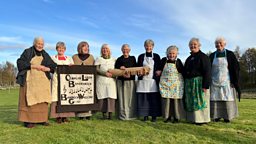
In times past, waulking would have been done by women seated around a table, who sang to pass the time. Their songs were typically uplifting in character, to break the monotony and help workers get into the gradually quickening rhythm of the hard physical work. The music is a window into the past, giving an insight into Gaelic history from the perspective of working women.
Sheila is responsible for keeping the waulking tradition alive today, leading her award-winning group in song at local schools, open mic nights and demonstrations at the Highland Folk Museum in Newtonmore. According to Sheila, each woman in the group has her own personal favourite, which she describes as "a song that feels like it’s about my life".
-
![]()
International Women's Day on Radio 3
For 24 hours on 8 March 2023, all the music you'll hear on Radio 3 will be written by women.
-
![]()
International Women's Day
Kate Molleson hosts a special live edition of Music Matters to mark IWD 2023.
-
![]()
The women erased from musical history
Rediscovering, restoring and recording music by five forgotten women composers.
-
![]()
The ±«Óãtv women who pioneered electronic music
How Daphne Oram and Delia Derbyshire's experiments paved the way for electronic music.
